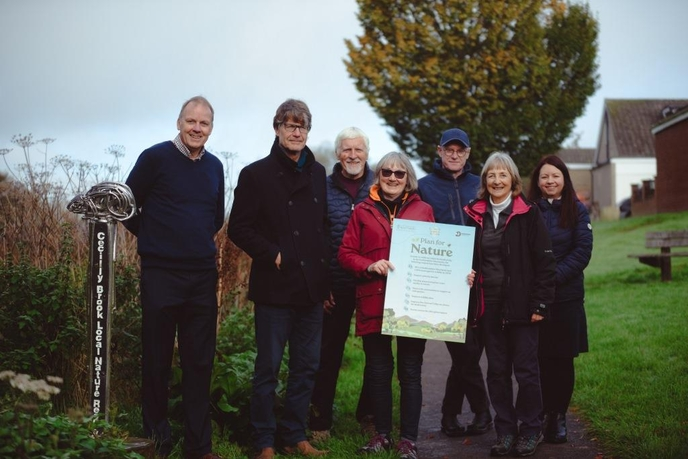Case studies

Above: The launch of Staffordshire Moorlands District Council's Plan for Nature, with representatives from the council, Staffordshire Wildlife Trust, and the local conservation volunteering group, Friends of Cecilly Brook.
Staffordshire Wildlife Trust has worked closely with Staffordshire Moorlands District Council on the development of a Nature Recovery Declaration and a Plan for Nature, an evidence-based strategy for nature recovery that was the first of its kind in the county. Within this strategy the council has committed to a number of targets, including ensuring that by 2030, 30% of all land in the Staffordshire Moorlands will be protected and looked after so that wildlife can thrive there.
In order to meet this ambition, the authority has appointed a biodiversity officer and has invested in ecological expertise from the Trust to input into planning applications. The actions it is taking also include reviewing the management practices of its green spaces to boost biodiversity, and investigating a range of avenues to enable them to meet the 30 x 30 target, including to identify suitable council-owned sites for receiving Biodiversity Net Gain. The council is also a partner in the Trust's Nature in your Neighbourhood project, which is working with communities to improve local green spaces for wildlife.
"It is great to see real ambition from this local authority to support nature's recovery. After all, one of the primary roles of a local council is to improve the quality of life and wellbeing of its residents, and creating a healthy natural environment is fundamental to this."

City of Doncaster Council declared a climate and biodiversity emergency in September 2019. The council committed to putting 'sustainability, biodiversity and carbon reduction at the heart' of its agenda, and noted Doncaster's low woodland and canopy cover compared to regional and national averages in its Environment and Sustainability Strategy.
Goals
Following this declaration, the council has made several pledges to help tackle the biodiversity and nature emergency, including to:
- increase the proportion of land given over to woodland, wood pasture and wildflower grassland.
- become carbon neutral by 2040, including an aim of reducing carbon emissions by 85% by 2030.
- plant one million trees between 2021 and 2031.
- embed 'Tackling Climate Change' as a core priority for the council, with the biodiversity emergency as part of its foundation.
Achievements
In the first five years, over 300,000 trees have been planted and in 2023, Doncaster was named a 'Tree City of the World' by the Arbor Day Foundation and the United Nations. The council was also a recipient of the Woodland Trust's Emergency Tree Fund which has further boosted tree planting across the city.

East Suffolk Council declared a climate emergency in 2019. In 2023, it extended this declaration to include nature, deliberately referencing biodiversity and ecology in the motion too. The council considered this crucial to addressing the 'existential crisis of our time'. Extending the declaration put it on equal footing with tackling greenhouse gas emissions, and was key to fulfilling other ambitions too, like joining the campaign for the Climate and Nature Bill, and requiring 20% biodiversity net gain from developers.
Goals
The council plans to deliver over 100 climate change, sustainability and nature-related workstreams as part of its eight Environmental Impact priorities.
This work includes the challenge of ensuring Nationally Significant Infrastructure Projects, like nuclear power station Sizewell C, comply with development plans and have the least possible impact on nature.
Achievements
By 2025, the council had:
- initiated the writing of a tree strategy with a motion.
- secured funding for several self-irrigating bee planters.
- carried out wildflower seed scrapes on verges.
- committed to achieve a 1% uplift in canopy cover with 250,000 new trees.